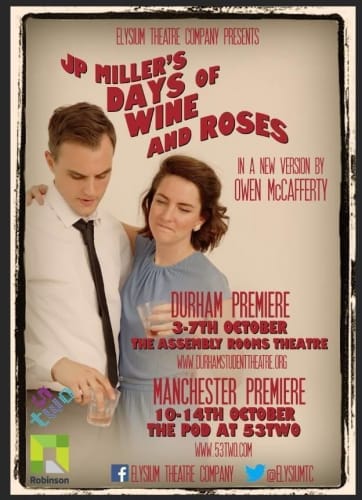March 7, 1964. The Cheltenham Gold Cup. The Irish challenger, Arkle, surges home ahead of the reigning English champion, Mill House. Arkle will win the next two Gold Cups and become a legend in Irish horse racing.
Right now, you may not give a flying fig about this, but by the time it comes up in Owen McCafferty’s marvellous reworking of J P Miller’s screenplay, Days of Wine and Roses (elegantly transported from 1960s America to Belfast / London of the same period), I promise you, you will.
Belfast airport, 1962. His flight to London delayed, Donal (a bookie’s assistant on his way to start a new job) takes a seat next to Mona (a civil servant, also leaving home alone, to start a new life). He likes her and gives her a tip about a special horse, one he’s sure will achieve great things. The horse is called Arkle. Before long, this articulate charmer has persuaded Mona to take her first alcoholic drink—a swig from his hip flask. Obviously interested, but determined not to let him rule the roost, Mona wrong-foots Donal by kissing him mid-sentence.
“Are you gonna do that again?” he asks, suddenly unsure of his ground.
A horse, a swig, a kiss. Three simple but potent ingredients setting us out on 80 minutes of compelling dramatic action.
When we next meet Mona and Donal on Westminster Bridge, he’s doing well, working for another bookie, and she, always a match for him, proposes marriage (just to help him along). They go for a drink to celebrate (as he predicted, she has developed a taste for it).
Married and now the mother of a son, Mona, housebound and lacking adult company, takes to drinking during the day. Meanwhile, Donal gets sent home early, because he’s too hungover to do his job properly. Things must change, he realises.
The day of Arkle’s Gold Cup triumph is a day of celebration for this lovely, loving couple. They’re off the booze and Donal has been offered a partnership in the bookmaker’s business. An Irishman in the long tradition of storytellers, Donal vividly describes the manner of the great horse’s victory. His wife leaps into his arms, joyously. We watch on, joyously, willing them happiness.
There is nervous laughter in the room when we learn that, through their dry spell, each has stashed away a bottle—just in case. But what harm can there be? This is a special occasion.
“We’ve earned this,” says Donal. And so it begins…
Trigger warning: from this point, the play contains two brief but significant incidents of domestic violence. My view is that the production shows this truthfully, in context, without seeking to excuse or normalise it. However, I am aware that I speak from a position of privilege, neither have experienced nor witnessed such events in life. I flag it up out of respect for others who may have a different reaction.
Unlike Miller’s original, McCafferty’s version downplays Donal’s role in his wife’s initiation to the demon drink. Although we have witnessed him, at Belfast airport, prod her towards that first step along the poisoned path, he bats away her solitary moment of accusation: “you went in with your eyes open.” It is one of the play's more cruel ironies, that Donal (understanding that there are 'rules') glimpses a way out of the hell; a possible escape his wife cannot seem to believe in.
It’s often overlooked that possibly the biggest challenge for a director (most especially with two-handers) comes in the casting. Casting Alice Frankham and Danny Solomon is not Jake Murray’s only success in this production, but clearly the one on which all others hang. This is the key to this production’s success: there is chemistry between these two. We follow their story not as two hopeless drunks, but as two brutally afflicted lovers. We believe in them and warm to them as a couple.
Solomon delivers a winning performance as the irrepressible racconteur, worshipper of Arkle and, above all, lover of Mona. His journey, from confident, boyish enthusiast to serious-minded father, working to build a life free from booze, is highly accomplished and a worthy foil for Frankham’s perfectly judged Mona.
Frankham gives us Mona as a heart-warming, heart-winning, heart-wrenching, heart-breaking creature, moving, with stubborn self-spite, from pert to pitiful; her every downward step assured and determined.
Murray’s direction gives the whole piece a measured tempo (never dragging, never rushing) and the timing of the verbal interplay is immaculate (we never get the sense that these are actors, dealing in lines each has spoken / heard a hundred times before). Physicality complements dialogue; the actors exploit the space, the set and each other to equally good effect.
Come awards season, if all three names do not feature on this year’s list of nominations, Manchester theatre will have had a very blessed year, indeed.
